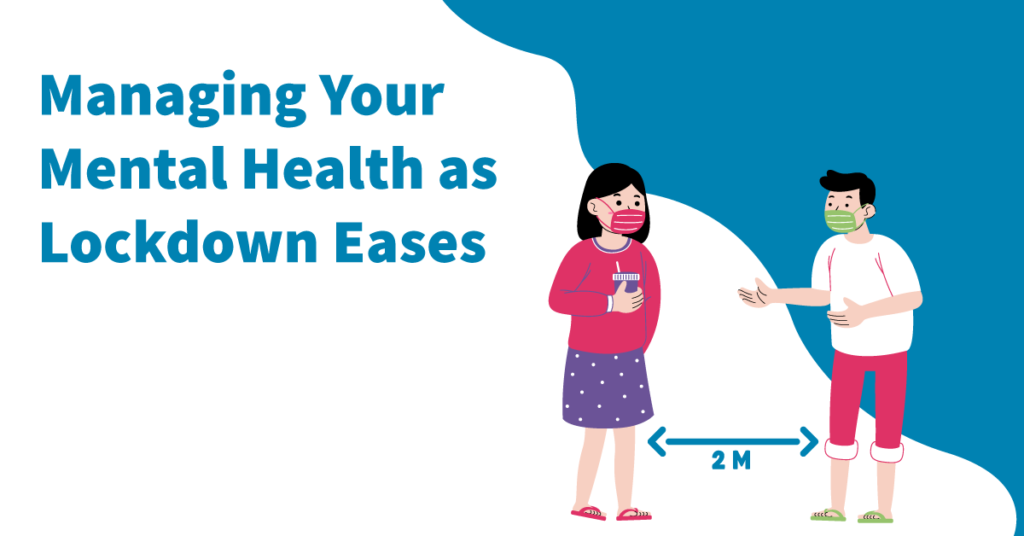Earlier in the year as we went into lockdown, we wrote an article about managing your mental health during lockdown as many of us would have felt scared, lonely and nervous about the future.
Lockdown has been difficult for a lot of us, but now as we are easing out of it, there will be new challenges, confusion and new things to get used to. You may be excited and relieved that things are moving back to ‘normality’, and you may be feeling less positive about these changes. These times are strange to everyone, so take things at your own pace and don’t compare how you are coping with others.

We’ve put together some tips on how you can look after and manage your mental health during more changes to come –
Talk about how you’re feeling to people you trust
It’s now getting to a point as restrictions are being lifted, where there is much more scope to see your loved ones. It’s important to talk to these people about how you’re feeling and what you are comfortable with when seeing people. You might have gotten comfortable with your own company and space during the lockdown, but now you will be pushing yourself out of your comfort zone. Sharing how you feel with someone you trust will help you set boundaries and expectations, as well as providing you with emotional support.
Pace yourself
Going at a pace you are comfortable with is key. Don’t push yourself into uncomfortable situations. Reconnecting with people is important, but you should take this at your own pace. You may want to suggest keeping online catchups a regular thing with your friends/family or suggest quieter meeting points opposed to places that may be busy and overcrowded. Consider that not everyone is going at the same pace, so move at your own and allow others to do the same.
Focus on what can be controlled and what is certain
This is easier said than done for many, but try and use the energy that you have to focus on the things that you can control. This will help you in feeling more hopeful and motivated to get things done. Have a plan in place for things you are going to be doing daily, and create a realistic action plan for when things may not go according to plan. As an individual, you can control your actions and by following the government guidelines you will contribute to slowing the spread of Covid-19.
Set yourself regular targets
Each day or week set yourself a target of something you want to do. It may be something small like setting an alarm to wake you up and start the day by making your bed or something to push yourself more into a ‘normal’ situation such as going to a supermarket or meeting a friend for a coffee. You should work up to bigger things that are way out of your comfort zone to build a tolerance and learn any coping mechanisms along the way. Keep note of everything that you have achieved to remind yourself that you are capable of so many things.
Give yourself a break
It’s important to do this even though the past few months it seems like everything has been put on pause. Giving yourself some time out to relax and recharge is going to be vital to ensure you don’t burn out.
Consider your options with work
Many people will be in so many different situations with work at the moment and now is the perfect time to reflect on what is best for you. If you have been working from home or on furlough, you should speak to your employer about the options for you coming back to work and what situations you are comfortable with. Your employer may be offering flexible working hours to help you ease your way back into things. Speaking to your employer about any concerns around anxiety/stress from the get-go will make the return to work smoother for both yourself and your employer. If you have or have had long-term mental health problems, you may be entitled to reasonable adjustments as a disabled person under the Equality Act.
If you have unfortunately lost your job and found yourself unemployed due to lockdown, you can find support from the government here. Remember there are many jobs still available in the UK and now is a perfect time for you to rewrite your CV, build online profiles such as LinkedIn and consider developing some new skills to support you into a new career.
Vary your routines
You may be comfortable sticking to the same routine every day, but as things have changed so much you should try doing things at different times than you usually would. This way you can find out what times you feel more comfortable visiting a supermarket, for example, it may be quieter to go later in the evening opposed to the middle of the day.
Get practical support from organisations who can help.
Mind has put together a coronavirus useful contacts page lists lots of organisations who can help with different aspects of the coronavirus pandemic, including bereavement, work and parenting.
As always, our safeguarding team are on hand to provide and support and advice when you need it.


